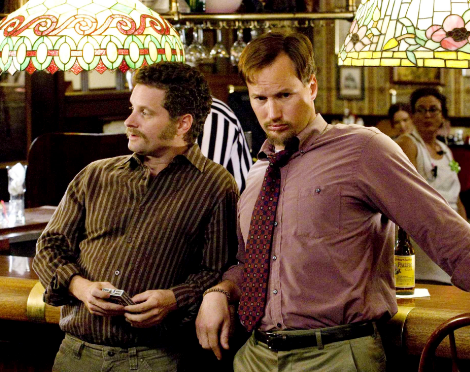For as strong of a start as Chris D’Arienzo’s Barry Munday gets with the introduction of its aloof, womanizing protagonist (played by Patrick Wilson), its inevitable conclusion is what leads to an ultimately prosaic feel, veering unavoidably toward the cliche rom-com ending.
While the film starts out interestingly enough as the anti-hero finds himself in a movie theater with an underage girl, followed by her disgruntled father intervening in the flirtation to hack off his “family jewels” (hence the film’s alternate title, The Family Jewels), it steadily reroutes to a conventional plotline. The trauma of the scrotal loss leaves him with no memory of who might have committed the offense–though of course the list is long considering his pattern with one-night stands.
Taking into account his sex-obsessed nature, the absence of his scrotum is quite a bane, one that prompts the questioning of his entire existence. And, fittingly, it is around this time that one of his former drunken flings, Ginger Farley (Judy Greer), decides to sue him for paternity. With everything suddenly put into sharp perspective, including how much he dislikes his job and his so-called friends, Barry sees this turn of events as an opportunity to try something he’s never really dabbled in before: full-fledged responsibility.
Adapted from Frank Turner Hollon’s Life Is A Strange Place, the film takes on a less quirky bent with its trajectory, with perhaps the most “bizarre” plot point being Jennifer (Chloë Sevigny), Ginger’s sister, shamelessly pursuing Barry when no one else is looking.
Indeed, the most interesting character is not Barry, but Ginger. For all her “two-dimensional” psycho bitchery, there is a complexity that lies beneath the surface of her distrust of Barry, as well as the reason she chose him to lose her virginity to. As their contentious rapport only intensifies after each one meets the other’s family–Barry’s mother, Carol (Jean Smart), being particularly averse to the union–it forces the duo to come together in the most hostile of environments and unpleasant of circumstances.
Still, just when you think that Ginger might actually “fall for” Barry, she keeps up her armor of detachedness to maintain a safe distance from his charms, and desire to be a better person. And it’s in this way that D’Arienzo tricks his audience into believing that Barry Munday might just be a little bit different from the usual rom-com fare. Whether this is a cruel or kind gesture depends on your preference when it comes to delighting in surprise to predictability.
As Barry gradually makes some headway in his life in terms of becoming more comfortable with letting go of his playboy ways, those around him appear to have a harder time adjusting to his new leaf–almost favoring the consistency of his fuck-up status. Even when he makes an effort to accompany Ginger to her OB/GYN appointment, she finds fault with his inappropriate line of questioning, snapping, “One trip to my doctor to ask him questions about his other patients’ vaginas is not stepping up.”
Even so, Barry can’t be deterred from staying involved in Ginger and his child’s life. After all, there’s nothing else for him to do at this phase of existence, which might make Barry Munday more depressing than the happy ending lets on: all it takes is desperation for a man to finally decide not to be a soulless philanderer.






















